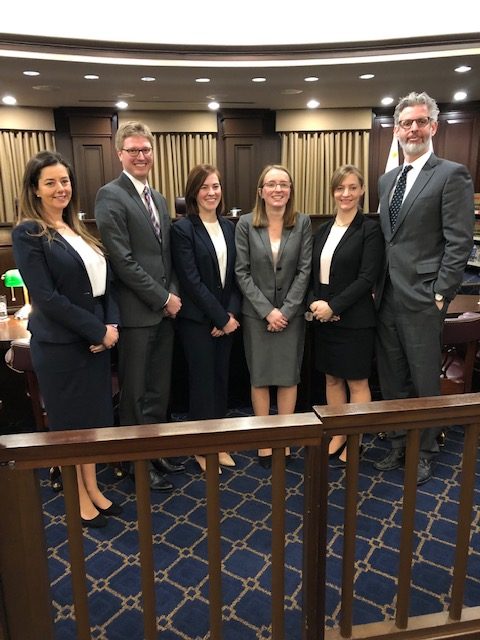CCK Partners with Harvard Law School in a Class Action Case at the Court of Appeals for Veterans Claims

CCK’s Partnership with Harvard Law School
In 2013, CCK partnered with Disabled American Veterans and Harvard Law School’s Veterans Legal Clinic to help address the vast unmet legal needs of veterans. This partnership also serves to facilitate law students’ participation in appeals before the U.S. Court of Appeals for Veterans Claims (CAVC). Through the Clinic, law students work under attorney supervision to provide pro bono representation to veterans before the Court.
Most recently, DAV, CCK and the Harvard Legal Clinic joined together as co-counsel to pursue a class action lawsuit at the CAVC. Specifically, the representatives are seeking to address VA’s use of the wrong legal standard in adjudicating claims for service connection based on aggravation and its wide-ranging implications.
38 CFR § 3.310(b): Aggravation of Non-Service-Connected Disabilities
VA’s regulations allow veterans to establish service connection for disabilities that result from an already service-connected condition. Specifically, “any increase in severity of a non-service-connected disease or injury that is proximately due to or the result of a service-connected disease or injury, and not due to the natural progress of the non-service-connected disease, will be service connected”. However, throughout the years VA has required veterans to demonstrate a “permanent” worsening – even though the word “permanent” does not appear in § 3.310 or controlling caselaw. Importantly, this issue of VA using permanent worsening to deny service connection based on aggravation has come before the Court many times, and is what led CCK and the Harvard Legal Clinic to pursue a class action.
CCK and Harvard Law Students Deliver Oral Argument at CAVC
On February 1, 2019, third year Harvard law students Casey Connolly and Laurel Fresquez presented an oral argument at the CAVC in Washington, D.C. under the supervision of CCK attorneys, Zachary Stolz and Emma Peterson, and the Harvard Law Clinic. The students argued on behalf of two CCK clients and proposed class members, addressing the issue of service connection based on aggravation as it pertains to those individual cases and Veterans Law as a whole.
In both cases, VA ordered examinations to determine whether the veterans had disabilities that were “permanently worsened” by already service-connected conditions. The student-representatives argued VA applied the wrong legal standard, a harder legal standard, for both veterans as there is nothing in the language of the law that requires that a disability must be permanently worsened in order for aggravation to exist. Rather, any increase in severity of a disability that results from a service-connected condition, and is not due to natural progression of the disability, should be entitled to compensation. Therefore, the unlawful standard VA applied is in violation of its own regulation.
As this issue has proven to be systemic, the student-representatives asked the Court to certify a class of veterans who have been or will be subject to the unlawful “permanent worsening” standard for deciding whether a service-connected disability has aggravated a secondary disability. Here, not only has VA consistently used the wrong legal standard, but the Secretary has formally adopted this standard in the VA Adjudications Manual as well. Importantly, the proposed class meets the key considerations common to class actions generally: numerosity, commonality, typicality, and adequacy of representation.
Class Actions at the CAVC: Monk v. Wilkie
On April 26, 2017, the Federal Circuit ruled in Monk v. Wilkie, that the CAVC has authority to certify a class action or similar “aggregate resolution” procedure. A class action is a type of lawsuit where on party represents collectively an entire group of similarly situated members. Class actions are often used in cases where a large number of people are adversely affected by the same situation. Therefore, they have the potential to shape VA policies that evade correction through the usual VA legal process, as is the case for the use of an unlawful standard of aggravation as described above.
About the Author
Share this Post
